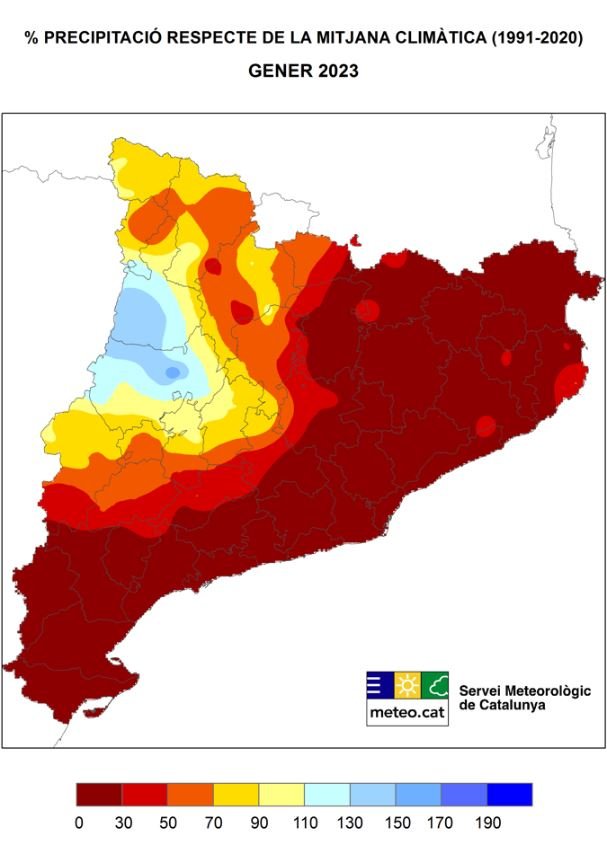Since this Thursday, a total of 224 Catalan municipalities - out of the total of 947 - and a total of fifteen counties - out of the 41 in the territory - have been subject to water restrictions in the fight against the drought. Nearly 6 million Catalans will be affected in one way or another, with the country's most populated areas the most impacted. Unfortunately, this is news that has been expected for too long and, although it is true that the fundamental reason is the lack of rain, governments and administrations are also responsible. An issue as critical as that of water has been treated with political dogmatism, disregarding the criteria of specialists in the matter, refusing to look for medium or long-term solutions, which the once-considered transfer of water from the river Rhône would have provided, and, finally, making life impossible for the companies in the sector by seeing them as competitors and not as the essential collaborators in developing a solution.
On March 14th, it will be fifteen years since the then Catalan environment minister, the leader of Iniciativa per Catalunya, Francesc Baltasar, offered the following prayer for rain to the Virgin of Montserrat, when he visited for the funeral of the abbot of the basilica, Cassià Maria Just: "You know I'm agnostic, but if you can do something, do it." Baltasar recounted this in the face of public concern and a barrage of criticism following the passivity of that moment. We are talking about 2008, and, in addition to the scene, as surreal as it is concerning, which the then-minister revealed to Catalunya Ràdio weeks afterwards, nothing else has been done - beyond offering a candle to a virgin or to Santa Rita, the patron saint of lost causes, and another to La Moreneta - to prevent us from finding ourselves in the situation that we have now.
Teresa Jordà herself, current Catalan minister for Climate Action, Agriculture and Food, declared last November and with the first water restrictions then already introduced for water use in industry, agriculture and parks and gardens - but without direct impact on the population - that "the public will not notice. There will be no water cuts. We have enough guaranteed drinking water for more than a year". She also predicted a January and February in which it would rain above what is usual for these first months of the year, a prediction that has fallen far short of the reality, as can be seen in the map showing precipitation as a percentage of the 1991-2020 climate average. Because of this, the reservoirs are at a worrying 28% of their total water storage capacity.

The Catalan Water Agency has also acted with the velocity of a tortoise and you only have to listen to farmers from all over thew territory who feel threatened by the drought and find themselves with an unknown prognosis: it is not only the risk of losing a harvest but that, among other things, almond or olive groves may die due to lack of water and seriously damage an economically and territorially important sector in Catalonia. This is not to mention how the drought has effects beyond the growing of crops, such as its impact on livestock, where without water there are no pastures, and there is no other option but to pay for animal feed.
For all this to be happening in Catalonia, and, in particular, in Barcelona and its area of influence, and that the country has an operator like Agbar that, in the different international studies that are regularly carried out, always appears as the top-ranked in the world in efficiency and quality of service, is very alarming. The water policies of the Barcelona City Council during the last few years and partly those of the Catalan government as well have gone against the interests of the population. Partisan demagoguery has taken precedence over the general interest, which should never come second. If this had not been the case, the reuse of water for potable use, which will now be launched, would have been carried out in time and the reserves would be greater.
The president of Agbar, Ángel Simón, explained a few months ago that one of the firm's projects, linked to the EU Next Generation funds, was to enable the reuse of water for domestic purposes in the metropolitan area of Barcelona and that this would mean increasing decontamination in sewage treatment plants, returning water to the river and then reusing it. Giving new life to this water would mean that the current drought would be the last one in terms of reserves and consumption. The approach is ambitious and there is a need, once and for all, to stop lashing out blindly and give up the idea, which has done so much harm, that the best path is that of public management and not that of the private firm. Interfering with something that works never ends up being good business. In the case of water, due to its experience, commitment and the results obtained so far, certainly not.

